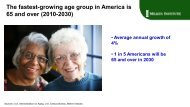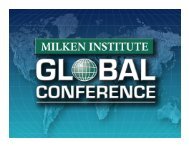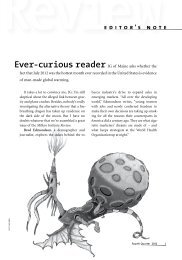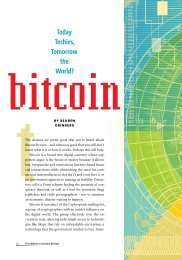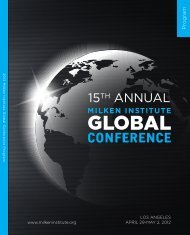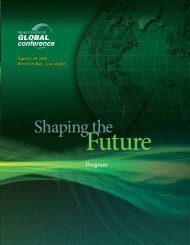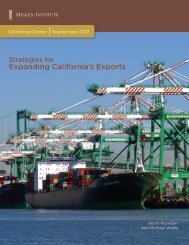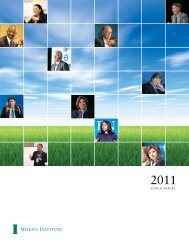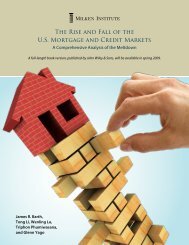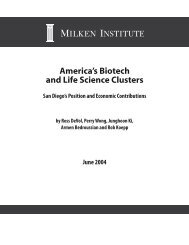Shaping the Future - Milken Institute
Shaping the Future - Milken Institute
Shaping the Future - Milken Institute
Create successful ePaper yourself
Turn your PDF publications into a flip-book with our unique Google optimized e-Paper software.
panelists<br />
Skip Rimer is Executive Director of Programs and Communications at <strong>the</strong> <strong>Milken</strong> <strong>Institute</strong>, where he has overall<br />
responsibility for <strong>the</strong> organization’s communications efforts and events. These include <strong>the</strong> <strong>Institute</strong>’s publications,<br />
website, media relations, social-networking outreach, as well <strong>the</strong> Global Conference and State of <strong>the</strong> State Conference.<br />
Prior to joining <strong>the</strong> <strong>Institute</strong> in 1998, Rimer worked for more than 20 years as a journalist, most recently as <strong>the</strong> executive<br />
editor of <strong>the</strong> Santa Monica Outlook. He also worked as a reporter and editor for <strong>the</strong> Ventura County Star in Ventura,<br />
Calif. He is <strong>the</strong> recipient of numerous writing awards, including from <strong>the</strong> Associated Press News Editors Council and<br />
<strong>the</strong> California Newspaper Publishers Association. He received his master’s degree from Columbia University Graduate<br />
School of Journalism and his bachelor’s degree from <strong>the</strong> University of California, Santa Barbara.<br />
Stephen Roach is Chairman of Morgan Stanley Asia, serving as <strong>the</strong> firm’s senior representative to clients,<br />
governments and regulators across <strong>the</strong> region. Before that appointment, he was chief economist at Morgan Stanley,<br />
where he has spent 25 years. Roach’s recent research focuses on globalization, <strong>the</strong> emergence of China and India, and<br />
<strong>the</strong> capital market implications of global imbalances. He is widely quoted in <strong>the</strong> media, contributes to <strong>the</strong> op-ed pages<br />
of <strong>the</strong> world’s leading newspapers and is <strong>the</strong> author of Stephen Roach on The Next Asia: Opportunities and Challenges<br />
for a New Globalization. Roach advises policymakers around <strong>the</strong> world and frequently testifies before Congress. Before<br />
joining Morgan Stanley in 1982, he was vice president for economic analysis for <strong>the</strong> Morgan Guaranty Trust Company<br />
and helped lead <strong>the</strong> research staff of <strong>the</strong> Federal Reserve Board. Previously he was a research fellow at <strong>the</strong> Brookings<br />
Institution. Roach received a Ph.D. in economics from New York University.<br />
Clifton Robbins is <strong>the</strong> Founder and CEO of Blue Harbour Group LP, which takes a private equity approach to <strong>the</strong><br />
public markets. A veteran investor with 25 years of experience, Robbins founded Blue Harbour in 2004. Before that, he<br />
was a managing member of General Atlantic Partners LLC, a global private equity firm, and served on General Atlantic’s<br />
Executive, Investment and Portfolio Review Committees. Prior to joining General Atlantic Partners in 2000, Robbins was<br />
a general partner of Kohlberg Kravis Roberts & Co., which he joined in 1987. He is a member of <strong>the</strong> Boards of Overseers<br />
and Managers of <strong>the</strong> Memorial Sloan-Kettering Cancer Center and currently chairs its Funding and Finance Committee,<br />
overseeing its $3 billion endowment. Robbins received a bachelor’s degree from Harvard College and an M.B.A. from<br />
Stanford University.<br />
James Robinson III is a General Partner of RRE Ventures, an information technology venture firm that he cofounded.<br />
He served as chairman and CEO of American Express Company from 1977 to 1993. Prior to American Express,<br />
he was a general partner with White Weld & Company and assistant to <strong>the</strong> chairman and president of Morgan Guaranty<br />
Trust Company. Robinson was also non-executive chairman of Bristol-Myers Squibb from 2005 to 2008 and a director<br />
and chairman of <strong>the</strong> Executive Committee of First Data Corp. He is presiding director of <strong>the</strong> Coca-Cola Company, an<br />
advisor to Novell, honorary chairman of <strong>the</strong> Memorial Sloan-Kettering Cancer Center and honorary trustee of <strong>the</strong><br />
Brookings Institution. He served as co-chairman of <strong>the</strong> Business Roundtable and as chairman of <strong>the</strong> Advisory Committee<br />
on Trade Policy and Negotiations. Robinson holds a bachelor’s degree from <strong>the</strong> Georgia <strong>Institute</strong> of Technology and an<br />
M.B.A. from Harvard Business School.<br />
Nouriel Roubini is a Professor of Economics and International Business with <strong>the</strong> Stern School of Business at New<br />
York University, which he joined in 1995. Popularly known as “Dr. Doom” (<strong>the</strong> title of a New York Times Magazine profile),<br />
he is known for his now-vindicated predictions of <strong>the</strong> current financial crisis, which he had been forecasting since 2006.<br />
He is co-author of Crisis Economics: A Crash Course in <strong>the</strong> <strong>Future</strong> of Finance, due in May, which reveals <strong>the</strong> methods he<br />
used to foretell <strong>the</strong> current crisis. He is chairman of Roubini Global Economics, an information and consultancy service.<br />
Roubini previously taught at Yale University; served as senior economist for international affairs at <strong>the</strong> White House<br />
Council of Economic Advisers; and has been a longtime consultant to <strong>the</strong> World Bank, <strong>the</strong> International Monetary Fund<br />
and o<strong>the</strong>r institutions. Roubini received his undergraduate degree from Bocconi University in Milan and a Ph.D. in<br />
economics from Harvard University.<br />
134



